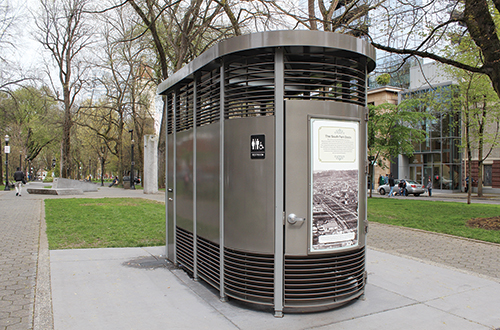
A group of Portland State students recently finished a research project entitled Right to Relief, which focused on the lack of public restrooms in Portland and how it affects the community. I’ve often wondered about the issue.
When I moved here three years ago, I was genuinely surprised at how few there were. As I walked around trying to learn my way around the city, I always had to find some business to let me use their restroom; usually I’d have to purchase something beforehand—something not everybody can afford to do.
Now that I’m familiar with the city, I know I’m more likely to run into a celebrity than a public restroom in downtown Portland. And because I make sure to relieve myself before I go out, the issue doesn’t impact me personally. Working at a restaurant downtown, though, I’ve seen the effects.
Every day, roughly 20 or so people enter the restaurant for the sole purpose of seeking out our restroom. While the PSU students’ restroom study focused on the homeless—who do make up a goodly portion of those who enter our restaurant for that particular reason—many restroom-seeking folks are shoppers and out-of-towners.
Though we have a “restroom for customers only” policy at our restaurant, many of our employees have decided to allow anyone to use it. It doesn’t harm us when we aren’t extremely busy, and when we are slow even the more suspicious characters don’t try anything nefarious because we aren’t distracted from their presence. In the event that one of our superiors doesn’t allow this, we direct restroom-seekers to the Pioneer Place Mall, which is a three-block walk.
It isn’t an issue that you hear about often, but it is one that certainly gets people excited. In the event that we do have to point people to the mall, they often become absolutely livid. I’ve been cussed out, berated and threatened for declining someone the use of our public restroom.
And not by the people you’d think. It’s often out-of-town adults with their children who become the angriest—the children are often thrust forth in a plea for lenience. One year, during the Rose Parade, our customer restroom was out of order and people freaked. We were packed, and though there was a gigantic sign on the door reading “restroom out of service,” people sheepishly lined up 15-deep, despite the fact that we repeatedly told them it was broken.
Parents wanted us to take their children to our employee restroom, which is downstairs. When we refused, they’d furiously claim their child was going to urinate themselves right then and there (as if all of this was our fault). One guy actually tried letting his son pee in the corner of our restaurant. When we prevented the pee-in-the-corner trick, the man shouted something about the “lesson” he was trying to teach us.
I don’t mean to simply tell stories, but in the two-plus years I’ve worked downtown I’ve accumulated at least 50-odd stories involving the use or misuse of our customer bathroom. The moral of the story is that the city isn’t making life convenient for people who come downtown to shop or visit.
Yes, there are a few of those silver-caged water loos, but good luck trying to find one. Just look at the amount of businesses that have signs on their doors or windows reading “no public restroom,” and you’ll see what I mean.
If you aren’t from here, it isn’t a pleasant day of shopping when you can’t find a bathroom for yourself or your children.
Another group of people I’ve heard complain about the lack of public restrooms is bicyclers. People who go for a ride into downtown or Southeast get here and then have to search forever to find a restroom. For being a town that invites jogging, biking and going to parks, we make it incredibly difficult to find relief when nature calls.
As for the homeless, I sympathize. I’m certain that not many local businesses allow them to use their facilities, and with no public restrooms this could lead to indecent exposure, giving police and Clean & Safe another reason to hassle them. Some might fret that the homeless will only use public restrooms to shoot up, but access to a restroom should be more than a privilege.

